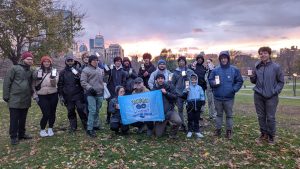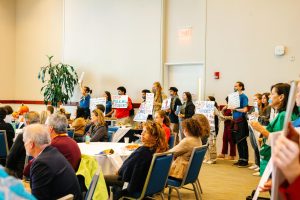UMass Boston hosted a panel Nov. 19 to recognize and discuss the International Day for Elimination of Violence Against Women, which is officially recognized on Nov. 25.
The panel was hosted by Tiffany Alford, the Director of Community Engagement and Inclusive Excellence. She was joined by Brikitta Hairston, who works in the Dean of Students department as the investigator for Title IX and Civil Rights cases; Kate Ranta, a survivor of domestic and gun violence and the author of “Killing Kate”; and Jen Bolton, the Director of Prevention and Education for the Domestic and Other Violence Emergencies organization.
Alford opened with statistics from the UN, stating that “16 to 58% of women globally experience technologically facilitated gender-based violence. And younger women are especially affected, with Generation Z and millennials the most affected. Women in conflict, war, and humanitarian crises are even more vulnerable: 70% of them experience gender-based violence.”
Afterward, Alford asked Hairston, Ranta and Bolton questions about recognizing the signs of partner abuse, misconceptions around domestic violence, the media’s role in domestic violence and how people can help others in these situations.
Ranta highlighted one of the misconceptions around domestic violence, the idea that the victim did something that caused the other person to react: “The idea that these abusers just snap, there’s like a crime of passion. Those are all just kind of terms I think are thrown around and it makes people maybe feel like they’re able to like, have a concept about why somebody would do something like this. But that’s just often not the case.”
Hairston believes that the most dangerous sign of domestic and sexual violence is escalating behavior. “If someone is put on notice that their behavior is harmful, or in my case, a policy violation, the behavior can not only continue, but get worse. That’s more so dangerous than someone who engages in threats and ultimatums, or improving behavior, or misogynistic ideology, just to name a few of the other risk factors,” she said.
Ranta referenced her own personal experience with her abuser as an example of escalating behavior. “There were obviously good things about him when I met him, or I wouldn’t have married or had a child with him. It’s insidious and it’s slow,” she said, adding, “The whole relationship wasn’t even three years, but it was still very slow to become increasingly abusive.”
Bolton emphasized the importance of patience as a friend or family member of a victim. “It can be understandable why a family member or a friend might be like, ‘I can’t be in communication with you anymore if you’re staying in a relationship with this person’ and feel like they’re doing that to really put the pressure on the person to leave. But really, all that does is give the abuser what they want. The victim is more isolated, the abuser has more control. It could take years for someone to be in a position where it’s safe to leave.”
Bolton also touched on the media’s role in skewing how people handle these cases, referencing celebrity cases such as P. Diddy, Chris Brown and Johnny Depp.
“We see people that have this allegiance towards the person that they always thought they were and really kind of sticking with that of like, not wanting to believe the victim. I think that is replicated on a much smaller scale in communities where it’s like, people will know someone’s partner or they’re well-known on campus and will say, ‘That person would never do this!’ or ‘They would never act this way!’ which adds to this disbelief of the victim.”
Ranta offered advice about how to go about approaching the topic of domestic and sexual violence. She said, “Speak openly and honestly about this topic. There’s a lot of blame and shame toward women about this. Educate yourselves — we have the internet, right? You can educate yourselves on the signs of emotional abuse. I would start there, because that’s where it started for me, and I didn’t even know I was in an abusive relationship until it was too late.”
Bolton also noted that, in addition to DOVE, every county in Massachusetts has a provider for domestic and sexual violence, and emphasized that they are a good resource to look toward if feeling unsure about what to do in those situations.
Afterward, Karen Ferrer-Muñiz, the Vice Chancellor for Student Affairs, spoke to show her appreciation for this event and those who made it possible. She also presented a trophy to Ranta after her speech, demonstrating the campus’s gratitude toward her work as an advocate speaking up against domestic and sexual violence.
Said Ferrer-Muñiz, “Standing with one another and doing things that we know they’re right, regardless of what happens, it’s still important. Sometimes there is a consequence of standing up, but that’s probably what we need to do to help someone and protect someone — and things happen for a reason. But I do want to say thank you.”




